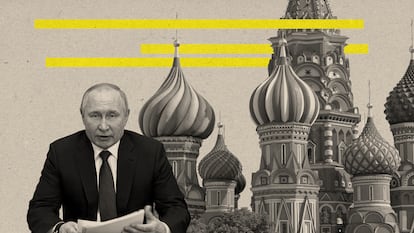
From ‘biological weapons’ to ‘pro-Nazi’ Ukraine: How Putin is trying to justify the war
In this analysis, EL PAÍS looks at the narrative the Russian leader is trying to build on the conflict, and how it matches up with reality
Last Wednesday, Russian President Vladimir Putin gave a speech on Russia’s war against Ukraine that was filled with accusations against the West, and not-so-subtle threats for alleged traitors of the country. In this analysis, we look at how Putin is trying to justify the war both to Russian citizens and to the world.
Vladimir Putin speech, March 16
Good afternoon, colleagues.
Taking part in our meeting are senior government officials, plenipotentiary presidential envoys in the federal districts and heads of Russian regions.
We are meeting in a complicated period as our armed forces are conducting a special military operation in Ukraine and Donbas.
“Special military operation”
Roskomnadzor, the organization in charge of monitoring and censoring Russian mass media, ordered the Russian press to eliminate any content that referred to the offensive in Ukraine as a “war,” and instead describe it as “a special military operation for the protection of the republics of Donetsk and Lugansk,” in line with the official government position. Several television broadcasters, including the Russian edition of the BBC, were blocked after refusing to do so.
I would like to remind you that at the beginning, on the morning of February 24, I publicly announced the reasons for and the main goal of Russia’s actions. It is to help our people in Donbas, who have been subjected to real genocide for nearly eight years in the most barbarous ways, that is, through a blockade, large-scale punitive operations, terrorist attacks and constant artillery raids.
“Genocide”
Both NGOs and journalists in the Donbas region confirm that no systematic killing has occurred in the area since the conflict broke out in 2014. Both Ukrainian forces and the Russian-backed separatists have carried out summary executions, but this cannot be considered genocide. At the Munich Security Conference in February, German Chancellor Olaf Scholz said that the term genocide was inapplicable to the situation in Donbas, describing Russia’s claims as “ridiculous.”
Their only transgression was to demand basic human rights: to live according to their forefathers’ laws and traditions, to speak their native language, and to bring up their children as they see fit.
“Native language”
Russian is the second-most spoken language in Ukraine. In 2019, the previous Ukrainian government approved a law to strengthen the Ukrainian language. Under this law, classes must be given in Ukrainian and all Russian media must also provide a version in Ukrainian.
During these years, Kyiv authorities have ignored and sabotaged the implementation of the Minsk Package of Measures for a peaceful settlement of the crisis and ultimately late last year openly refused to implement it.
“Minsk Package of Measures”
Neither side has met the Minsk agreements of 2014 and 2015 to establish peace in eastern Ukraine. The Kremlin has been calling on Kyiv to concede the separatist area a special status via a constitutional reform (point 11) and to hold elections there (point 12). For there to be fair elections, the Ukrainian government has demanded that all armed groups leave the area (point 10), that all Russian heavy weapons be withdrawn (point 3) and for Kyiv to recover control of the Donbas border with Russia (point 9).
They also started to implement plans to join NATO. Moreover, Kyiv authorities also announced their intention to acquire nuclear weapons and delivery vehicles. This was a real threat.
“Nuclear weapons”
Ukrainian President Volodymyr Zelenskiy never announced any deployment of nuclear weapons in his country. At the Munich Security Conference in February, the president said that he would call on the signatories of the 1994 Budapest Memorandum to demand guarantees of security. Failing these assurances, he said the deal would be declared void. Under that agreement, which was signed by Russia and the United States, Ukraine gave up the nuclear weapons it had inherited from the USSR in exchange for guarantees on its territorial integrity and sovereignty. Zelenskiy said that he had tried three times to convene the signatories, and that his fourth attempt would be the last. He did not, however, speak of nuclear rearmament.
With foreign technical support, the pro-Nazi Kyiv regime would have obtained weapons of mass destruction in the foreseeable future and, of course, would have aimed them at Russia.
“Pro-Nazi Kyiv regime”
The president of Ukraine, Volodymyr Zelenskiy, is Jewish. The Kremlin was on friendly terms with the leader from 2019 until 2021, when relations broke down following the arrest of Viktor Medvedchuk, a pro-Moscow Ukrainian politician, and the sanctions against television channels linked to him. Russia quickly recognized the electoral wins of both Zelenskiy and his predecessor, Petro Poroshenko. The accusations that the government is “pro-Nazi” is based on the fact that, during the conflict in Donbas, Ukraine’s armed forces included volunteers from the Azov and Pravy Sektor (Right Sector) battalions, whose members are accused of harboring neo-Nazi ideology and honoring the ultranationalist Stepan Bandera.
There was a network of dozens of laboratories in Ukraine, where military biological programs were conducted under the guidance and with the financial support of the Pentagon, including experiments with coronavirus strains, anthrax, cholera, African swine fever and other deadly diseases. Frantic attempts are being made to conceal traces of these secret programs. However, we have grounds to assume that components of biological weapons were being created in direct proximity to Russia on the territory of Ukraine. Our numerous warnings that such developments posed a direct threat to the security of Russia were rejected with open and cynical arrogance by Ukraine and its US and NATO patrons.
“Military biological programs”
The United States makes no secret of the fact that it finances several Ukrainian laboratories under the Cooperative Threat Reduction program to prevent outbreaks of possible pandemics. The origin of this program dates back to the fall of the Soviet Union, when Washington supported transferring military investigations to civilian ones in the former USSR. The Kremlin bases its claims of Ukraine’s “biological weapons” on statements made by Victoria Nuland, the US under secretary of state for political affairs, who detailed the activity of these civilian laboratories. But Russia’s arguments have no credible bases. The Russian offensive in Ukraine, however, has increased the risk that samples in these facilities will escape and spread.
In other words, all our diplomatic efforts were fully in vain. We have been left with no peaceful alternative to settle the problems that developed through no fault of ours. In this situation, we were forced to begin this special military operation.
“We were forced”
The official Russian rhetoric denied the possibility of war until it recognized the self-proclaimed republics of Donetsk and Lugansk on February 21, the same day that Putin ordered troops into the eastern Ukrainian region. The night of Friday, February 18, Russian-backed separatists posted videos in which they ordered an “emergency” evacuation of the civilian population due to the supposed threat of an imminent Ukrainian offensive and the growing violations of the ceasefire introduced on February 17. But the metadata from these videos show that they had been recorded on Friday 16, even though Denis Pushilin, the head of the so-called Donetsk People's Republic, is heard saying “today, on February 18.” The week before the war, Putin met with German Chancellor Olaf Scholz. Following this meeting, the Russian leader said that he was open to negotiating NATO’s proposals.
Tu suscripción se está usando en otro dispositivo
¿Quieres añadir otro usuario a tu suscripción?
Si continúas leyendo en este dispositivo, no se podrá leer en el otro.
FlechaTu suscripción se está usando en otro dispositivo y solo puedes acceder a EL PAÍS desde un dispositivo a la vez.
Si quieres compartir tu cuenta, cambia tu suscripción a la modalidad Premium, así podrás añadir otro usuario. Cada uno accederá con su propia cuenta de email, lo que os permitirá personalizar vuestra experiencia en EL PAÍS.
¿Tienes una suscripción de empresa? Accede aquí para contratar más cuentas.
En el caso de no saber quién está usando tu cuenta, te recomendamos cambiar tu contraseña aquí.
Si decides continuar compartiendo tu cuenta, este mensaje se mostrará en tu dispositivo y en el de la otra persona que está usando tu cuenta de forma indefinida, afectando a tu experiencia de lectura. Puedes consultar aquí los términos y condiciones de la suscripción digital.









































